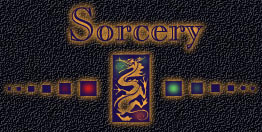
The system of sorcery presented in the ADRPG sourcebook is not used in Sharper Than a Serpent's Tooth. The system of lynchpins and microspells is just too much to keep track of and not particularly fun. Instead, here is the faster, looser system we use:
Basic Sorcery
Anyone with Basic Sorcery has an ability to sense magic. This is known as "Mage Sight". Mage Sight is not a constant sense, like sight, but must be consciously activated.
Sorcerers at this level of power can easily perform minor magics (such as lighting a pipe with fire from the eyes, or causing an unfelt wind to ruffle clothing).
Nearly any sort of magical effect may be created, but the power required is enormous and must be drawn directly from the sorcerer's own body. This is exhausting, and even potentially fatal to a sorcerer of merely human endurance. Because of this, spells are usually prepared ("hung") in advance. By so doing, the sorcerer can expend the energy at leisure, and then simply release it when needed without straining his body.
Only one such spell can be memorized ('hung' in the mind) at a time. Any others require focus devices such as staves, wands or rings on which to hang the spell. The number of spells which can be hung at any one time depends on the Psyche of the sorcerer, and their power depends on the his Endurance. Hung spells require require weekly maintenance to keep the stored energy from bleeding off.
It is possible to cast a spell on the spot, without having previously 'hung' it. This spell will derive it's energies directly from the caster. This would incapacitate or kill one of merely human Endurance. In those of more gifted Endurance, such efforts may cause dizziness or even fainting and are generally a last-ditch effort.
Rack Named and Numbered Spells
This skill adds to the sorcerer's flexibility. It allows him to hang up to one dozen spells in his own memory, rather than having to hang them on objects. The drawback to this ability is that spells so hung are slightly unstable and will bleed away when the sorcerer is under extreme duress, such as when unconscious (not merely asleep), suffering from severe wounds, or when using a Major Power.
Ceremonial and Ritual Sorcery
At this level of mastery, the sorcerer has learned to augment his own energies with the energies of whatever shadow he is in. Such energies are tapped by the use of rare materials, sacrifices, places of magical power, special days of the year, and/or ritual circles and pentagrams. The specifics are decided by the GM and player. Ceremonial sorcery is always slow and laborious when compared to basic sorcery, but can result in more powerful and more permanent spells. This is the first level of mastery at which the sorcerer can create permanently enchanted objects or spell effects.
Complex Sorcery
Few shadow sorcerers ever reach this level of mastery, for this is the realm of true power. Here, the sorcerer has discovered an ability to tap a power source other than his own body. This allows the use of spontaneous sorcery far more frequently, and requires only a minimal expenditure of the sorcerer's own Endurance.
The specific Power tapped will place it's own limitations on the sorcerer. Some sources may be useful only in a given shadow or set of shadows. Some may be useful for only a limited type of magic (pyromancy or illusion, for instance). Others may not be able to fuel the sorcerer's most powerful spells. All these details depend on the type of Power tapped.
This is not the same as imbuing a spell with a Power. It is merely allowing the Power to fuel the spell. This requires only that the sorcerer is an initiate of the Power in question.
